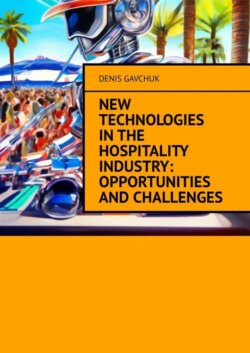New technologies in the hospitality industry: opportunities and challenges

Реклама. ООО «ЛитРес», ИНН: 7719571260.
Оглавление
Группа авторов. New technologies in the hospitality industry: opportunities and challenges
Introduction
Chapter 1: Introducing Robots to Hospitality
History and examples of using robots in hotels and restaurants
Robots for automating routine tasks
The impact of robots on the customer experience
Economic and operational benefits of using robots
Examples of successful robot implementation
Chapter 2: Artificial Intelligence and its role in improving Guest Services
The main directions of using AI in hospitality
AI to personalize the customer experience
Automation of hotel room booking and management processes
The impact of AI on improving the level of security and convenience for guests
Examples of successful AI implementation
Chapter 3: Using GPT Chat and Other Types of Chatbots
Overview of chatbot technologies and their capabilities
Chatbots for providing round-the-clock customer support
Using GPT Chat to improve customer interaction
Examples of successful implementations of GPT chat in the hospitality industry
Problems and challenges associated with implementing chatbots
Conclusion
List of sources
Отрывок из книги
The current state of the hospitality industry is characterized by dynamic development and adaptation to changes in consumer preferences. The hospitality industry, covering segments such as hotel business, restaurant services, travel services and entertainment events, is showing steady growth. According to the World Tourism and Travel Council, the sector’s contribution to the global economy was $ 8.9 trillion in 2022, demonstrating its importance and potential for further growth.
In today’s world, technology plays a key role in transforming the hospitality industry. Their importance cannot be overemphasized: new technical solutions not only improve the quality of customer service, but also optimize operational processes, reduce costs and increase the competitiveness of companies. The use of technologies such as artificial intelligence, the Internet of Things, and blockchain opens up new horizons for businesses and increases customer satisfaction. For example, the use of artificial intelligence-based chatbots for booking rooms and processing guest requests can significantly reduce response time and increase the efficiency of customer interaction.
.....
At the same time, automating routine tasks using robots opens up huge opportunities for improving the operational efficiency of the hotel business. A successful example of such implementations can be observed in hotels of theHenn-nachain in Japan, where since 2015 robots have been performing a significant part of routine tasks related to guest service. This hotel chain notes a 20% reduction in operating costs and a 15% increase in customer satisfaction. The use of robots to automate routine tasks such as luggage delivery and room cleaning provides an opportunity for the hotel business to significantly reduce costs, improve the level of service and adapt to modern standards of hygiene and safety. Despite the existing challenges, competent implementation of robotics can become a key competitive advantage in a rapidly changing market environment.
One of the most significant innovations in the hospitality industry was the integration of robotic technologies. Robots in hotels perform various functions, ranging from luggage delivery to room cleaning, and significantly increase the comfort of guests. An example of successful implementation of such technologies is the M Social Singapore Hotel, which has been using robots to deliver luggage directly to rooms since March 2019. These robots are able to move through all floors of the building, performing about 100 deliveries per day. Guests of the hotel note the convenience and speed of service, which, of course, positively affects the overall impression of the stay. Another important aspect is related to improving sanitary conditions. Modern robotic cleaning systems, such as RosieSavioke’s Rosie robotSavioke, can automatically clean and disinfect hotel rooms and public areas. In the post-pandemic world, when hygiene and safety issues have become particularly important, such robots have proved to be irreplaceable assistants. According to Savioke, cleaning robots can perform a thorough cleaning of one standard room in just 30 minutes, which is significantly more efficient and faster than traditional methods. However, it should be borne in mind that the introduction of robotic technologies in the hotel business is accompanied by certain challenges. First, there are significant financial costs at the initial investment stage. So, according to a study by the International Association for Hotel Robotics, the average cost of a single robot for luggage delivery is about $ 150,000, and a robot for room cleaning is about $ 200,000. These figures can be a real barrier for small hotels. You also need to take into account the annual operating costs for robot maintenance, which can reach $ 10,000.
.....